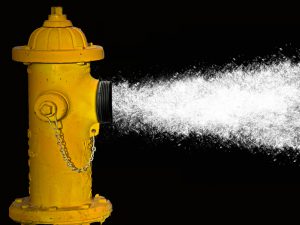
Starting in October, Osceola Water Works will begin transitioning to winter maintenance and will be making a change in the water treatment process. While residents may notice a difference, there will be no cause for alarm.
In early October, the water works department will begin their annual fire hydrant flushing program. This process allows OWW to perform routine maintenance on the hydrants and to clean out sediment that has settled in the water mains. Department employees will open the fire hydrants and allow them to flow freely for a short period of time. Residents may notice a slight discoloration or trace amounts of sediment in their water, but should not be alarmed. If darkened or rusty water comes from your tap, don’t worry – simply let the water run for a few minutes until it runs clear again.
Also during this time, the Osceola Water Works will make a temporary change in the disinfectant used in water treatment. Osceola’s annual switch from chloramines to free chlorine is a common practice in water treatment and OWW goes through the process every fall. Free chlorine is a stronger disinfectant than chloramine, but it cannot be used year-round because it creates byproducts that are regulated by the Environmental Protection Agency. The use of ammonia with chlorine – chloramines – reduces or eliminates these byproducts and help your Osceola Water Works department continue to provide clean and safe drinking water for all residents. This proactive cleansing step, used in conjunction with hydrant flushing, ensures that Osceola Water Works can maintain the best levels of disinfection throughout the water system and eliminate harmful bacteria in the water mains and pipes throughout the city.
From October 12th through November 12th, residents may notice a stronger chlorine odor and taste in their tap water due to the change in disinfecting products. This change poses no risk to the people of Osceola, but we recommend the testing of any water being added to aquariums or ponds to avoid harming fish or other animals. Pet stores or fish supply stores should have additives to remove free chlorine or chloramine from water used in fish tanks or ponds. Residents who are sensitive to chlorine will want to keep an open container of tap water in the refrigerator to allow the chlorine to naturally dissipate and reduce the strong chlorine taste and smell of the water.
Osceola Water Works will continue to work hard to meet the needs of the people of Osceola by utilizing safe disinfectants and implementing an annual hydrant-flushing program,” said Water Works Superintendent Brandon Patterson. “Our staff is dedicated to bringing the safest and best-tasting water in Southern Iowa to the residents of Osceola.”
If you have questions or comments about your water service, please contact Brandon Patterson, Osceola Water Works Superintendent, 208 West Jefferson Street, PO Box 515, Osceola, Iowa 50213, phone: 641-342-1435 or email: osceolawater2@windstream.net